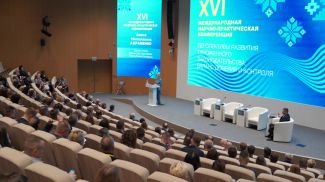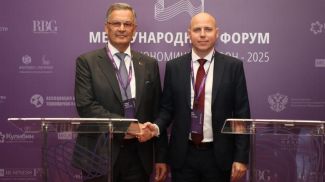MINSK, 28 March (BelTA) – Ordinance No. 8 on digital economy development dated 21 December 2017 comes into force on 28 March, BelTA informs.
The document has been drafted on the instruction of the head of state by the administration of Belarus' Hi-Tech Park (HTP), the IT community, the country's leading law and consulting firms, and foreign experts.
The document has extended the duration of the Hi-Tech Park's special taxation and regulation regime till 2049 and preserved the exterritorial principle of registration. The business environment has remained unchanged for the HTP resident companies.
The ordinance is meant to expand the list of activities for the HTP companies, support IT education, enable comfortable conditions for training IT specialists, developing food tech companies, and comprehensive business regulations for blockchain-based businesses.
The Hi-Tech Park's resident companies are now allowed to pursue new types of activity such as the development of biotechnologies, medical technologies, aviation technologies, space technologies, and e-sports. They can now both develop and make high-technology knowledge-intensive products. The resident companies have been given more leeway to commercialize the software they develop, including by means of advertising and marketing services, business process outsourcing, and other things. The new ordinance does not envisage any of the previous restrictions on the amount of revenue from additional activities (consulting, testing, and others).
The ordinance has enabled the legal environment for initial coin offering (ICO), using cryptocurrencies, and introducing smart contracts. The ordinance does not envisage any restrictions or special requirements for operations to create, store, acquire, and exchange tokens, for cryptocurrency platforms and cryptocurrency exchange operators. Individuals are exempt from personal income tax on the incomes from mining, acquisition and sale of digital tokens. Digital tokens shall not be declared.
The document gives a boost to the development of tech food companies. It has facilitated the procedures for foreign business deals via internet. The deals can now be made online.
The Digital Economy Development Ordinance has introduced several English Law components such as convertible loans, stock options, option contracts, non-compete agreements, indemnification of material losses. The introduction of these components will enable comfortable conditions for venture capital funds and will provide potential investors with the instruments that are widely used in the world.
The HTP resident companies are now allowed to provide education services in ICT under programs adopted by the HTP administration. A number of measures have been stipulated to attract top IT specialists to Belarus. In particular, the HTP companies no longer need to obtain work permits for foreign workers. Such foreign nationals now need to follow a simplified procedure to get a temporary resident permit. Visas have been abolished for foreign workers and founders of the HTP resident companies.
The adoption of the Digital Economy Development Ordinance has prompted many companies to join the HTP. The number of HTP resident companies grew by a quarter from 192 to 238 in Q1 2018. This is the first such dramatic one-time increase in the HTP's history which spans more than a decade. The new resident companies are mainly related with artificial intelligence, machine learning, the Internet of Things, and augmented reality.
As a follow-up to Ordinance No. 8, the National Bank of the Republic of Belarus (NBRB) has amended the requirements for internal control in banks and non-bank financial institutions to fight money laundering, terrorist financing, and the spread of weapons of mass destruction. The Finance Ministry has adopted the National Accounting and Reporting Standard "Digital Signs (Tokens).













